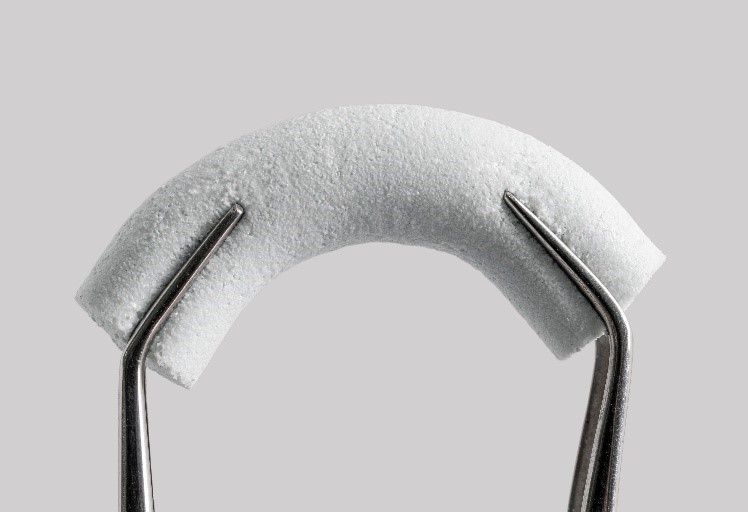A revolutionary bone substitute that has already saved at least one accident victim from a leg amputation has obtained CE certification, allowing it to be commercialised in the EU. The clinical trials which made this possible were financed by the European Regional Development Fund.
- 15 November 2021
‘The introduction of the “artificial bone” on the domestic and international market is an example of good cooperation between academia and business. I am satisfied that EU funds contributed to the clinical trials that served to commercialise this invention.'
FlexiOss®, a synthetic material similar to human bone, has won 14 awards and been allocated three patents. In total, 41 people have already received implants in experimental procedures, according to a Euronews report dated January 2020.
It is made of the mineral hydroxyapatite – found in bones, teeth and coral – and contains no animal-derived products. Consequently, Medical Inventi, the Polish company behind its commercialisation, is looking to introduce it into the Arab world, where the use of animal-derived products in medical procedures is culturally sensitive.
Easy to use
FlexiOss looks like pumice stone and can be easily cut to size. When wet, it can be shaped like putty to fill cavities. Because it is porous, it can absorb blood and medicine and bone cells can grow into and around it. This eliminates the need for a second surgery to remove the implant. As it contains no animal products, there is less chance of a patient’s body rejecting it.
To date, the recipients have included a motorbike accident victim whose right femur was shattered and risked having his leg amputated. His surgeon was able to replace the pieces of missing bone with the new material and a metal plate, saving his leg. Eight years after the operation, the man is able to walk unaided, with only a slight limp.
Wide-ranging applications
Professors Grażyna Ginalski and Anna Belcarz at the Medical University of Lublin, Poland, developed FlexiOss after orthopaedic surgeons complained about the bone-substitute products currently in use. They come in either powder or granular form and are difficult to work with.
Surgeons can use the new material to fill cavities up to 7 cm long. Applications include replacing sections of limb and craniofacial bones – for example, where cancerous tissue has been removed – veterinary surgery and the repair of bones damaged by osteoporosis.
Medical Inventi was created by academics at the Medical University of Lublin and private capital, with the aim of commercialising scientific research.
Total investment and EU funding
Total investment for the project “Clinical studies of the FlexiOss bone substitute biocomposite called artificial bone” is EUR 1 004 316 (PLN 4 287 724), with the European Regional Development Fund contributing EUR 514 528 (PLN 2 196 673) through the Regional Operational Programme for the Lubelskie Voivodeship for the 2014-2020 programming period. The investment falls under the priority "Targeted research".

